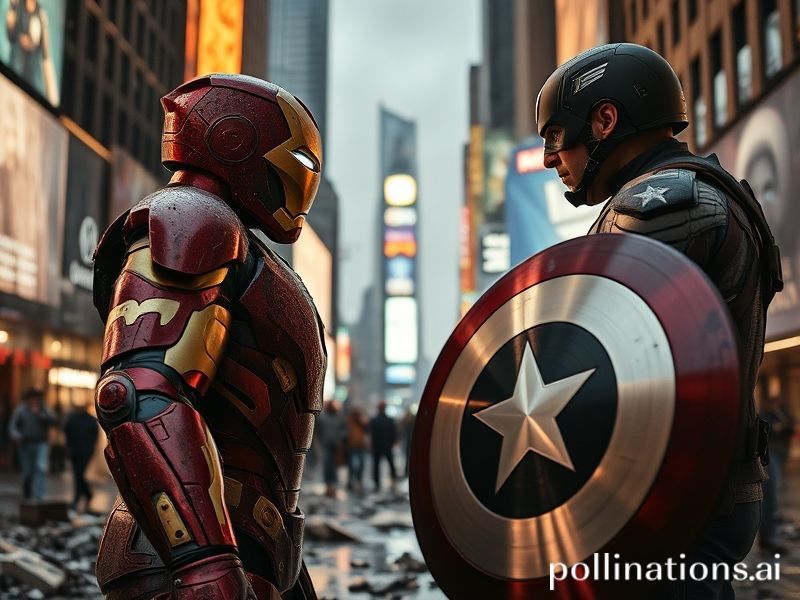marvel rivals
Marvel Rivals: When Super-Powers Collide in the Shadow of Real-World Chaos
By Our Man in the Multiverse
In the grand tradition of pitting gods against each other for our mild amusement, Marvel Entertainment has once again invited the planet to watch its costumed demigods punch each other through digital skyscrapers. Marvel Rivals—the freshly announced 6-v-6 hero shooter—doesn’t merely promise another round of corporate-sponsored fisticuffs; it stages a geopolitical parlor game in which Lagos traffic jams freeze for a moment while Iron Man and Doctor Strange trade plasma bolts over who forgot to mute their mic.
From Seoul’s neon esports arenas to São Paulo’s lan-houses that still smell of instant noodles and adolescent dreams, the announcement landed with the same dull thud as every other franchise reboot: equal parts giddy hype and existential dread. NetEase, the Beijing-based co-developer, swears the game will launch simultaneously in 200 territories—an impressive claim until you remember that half of those territories still argue over whether “ping” is a networking metric or a Cold War submarine.
The trailer opens—because of course it does—with the Statue of Liberty getting bisected by a glowing rift, a visual metaphor so on-the-nose that even French critics rolled their eyes. Liberty’s head drifts past a K-pop billboard, crashes into a London double-decker, and lands in a Shanghai gutter, thereby ticking the “global inclusivity” box without the bother of nuanced storytelling. One can almost hear the marketing interns high-fiving over Zoom: “We literally decapitated Western ideology and shipped it East—engagement metrics will be *chef’s kiss*.”
Meanwhile, in the non-pixelated world, the UN Security Council is busy arguing about grain exports and submarine cables. But why fret over Black Sea shipping lanes when you can watch Black Panther body-slam Loki through the roof of a virtual Odessa nightclub? The timing is sublime: just as diplomats in Geneva trade sternly worded communiqués about AI governance, Marvel Rivals lets teenagers pilot an AI-controlled Hulk to hurl an AI-controlled Moon Knight into low orbit. Somewhere, a policy expert sobs quietly into his sustainable quinoa salad.
The business side reads like an IMF bailout in spandex. Disney, still staggering from streaming-service write-offs large enough to bail out a medium-sized European nation, has outsourced the heavy lifting to NetEase, the Chinese conglomerate that already knows how to monetize every twitch of your amygdala. Revenue will be split in ways only three tax havens and one Swiss accountant truly understand. If the game flops in North America, no worries: the Asian whale market—where one Shanghai dentist can drop the GDP of Malta on cosmetic skins—remains the ultimate insurance policy.
Cultural imperialism, you say? Relax. Marvel Rivals promises region-specific heroes, starting with “Luna Snow,” a K-pop idol whose super-power is literally dropping beats so sick they fracture dimensional barriers. (North Korean state media has yet to comment, presumably busy drafting a counter-proposal: “Pyongyang Pulse,” a hero whose bass lines trigger agricultural surpluses.)
The cynical observer—hello—notes that every global launch is now less about entertainment and more about stress-testing international payment rails. Will Steam wallets in Buenos Aires accept Turkish lira? Can a teenager in Lagos buy a battle pass when the local naira exchange rate fluctuates like a caffeinated day-trader? These are the modern Silk Road questions, answered not by caravans but by microtransaction servers humming in Reykjavik basements.
And yet, beneath the snark lies a twitch of recognition: we keep buying tickets to these gladiatorial cartoons because the alternative is reading the actual news. While diplomats exchange terse cables about Arctic shipping routes, we queue up to watch Storm freeze Cyclops on a virtual ice floe—a cheaper therapy session than anything licensed in Vienna.
Conclusion: Marvel Rivals will make billions, fracture a few friendships, and spawn at least two academic papers on post-colonial digital iconography. It won’t solve the climate crisis, but neither will COP29, and the costumes are better here. In the end, humanity’s grand strategy remains unchanged: when reality disappoints, reboot the multiverse. Pass the popcorn—extra salt, like the wounds of the real world we’re briefly ignoring.







